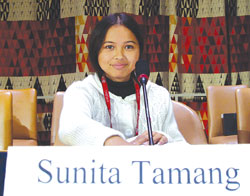 In my community it is not surprising to find girls and women lagging behind, especially in education. Many people still feel that it is a waste educating a girl because she will marry and go to someone else\'s house. I was not sent to school as a child. I was lucky that an agency like UNICEF was there assisting girls who missed out on regular school to attend catch-up classes.
In my community it is not surprising to find girls and women lagging behind, especially in education. Many people still feel that it is a waste educating a girl because she will marry and go to someone else\'s house. I was not sent to school as a child. I was lucky that an agency like UNICEF was there assisting girls who missed out on regular school to attend catch-up classes.
After two years of non-formal education, I joined regular school in grade five. I am now in grade 10 and in two months I will be appearing for SLC. I go to school in the mornings and work at a factory assembling match boxes in the afternoons.
While at the out-of-school classes, our friends got together and opened a \'Working Children\'s Club' to help other working children in our community. We organised street dramas, quiz contests, cultural programs and painting competitions so everyone would know about discrimination between sons and daughters, on HIV/AIDS, the rights of working children and similar issues.
There was a girl in our neighbourhood working as a domestic helper in the house of a deputy superintendent of police. We suspected that she was being abused by her employers, because one of our club members had heard screams from the house. We approached the employer. Because he was a policeman, he tried to scare us off. But we didn\'t give up. We persisted and with help from others finally convinced the policeman not to abuse the rights of the girl, and to send her to school.
This is an example of how we have been fighting for the rights of disadvantaged children forced to work at the expense of their education and their future. This is what we were able to do with just our enthusiasm. If this is what children could do, governments, with all their power and resources, should be able to do much more so that every girl and boy can go to school.
Huge effort is needed to bridge the gap in social beliefs, economic conditions to change people\'s minds on getting girls educated. It takes much more effort to send girls to school. What helped me was the break I got to attend catch-up classes, the uniform that was provided to me free of cost to attend regular school.
What would help many other girls who are not as lucky as me is for the government to ensure free education for all children, with the option of vocational education for working children, or children who have returned from the conflict. All it needs a little bit of effort, extra money and commitment in providing opportunities for disadvantaged children to get educated.
Look at me, I work in a match factory and today I have been able to come here and share my feelings and experiences with you all.
Sunita Tamang, 15, is a student at the Jana Bikas Secondary School in Biratnagar. She was in New York last week as a panelist in the 'Girls Speak Out' session at the 51st Commission on the Status of Women. Binita Shrestha, radio producer of 'Saathi Sanga Manka Kura' translated Sunita\'s speech at the session.



